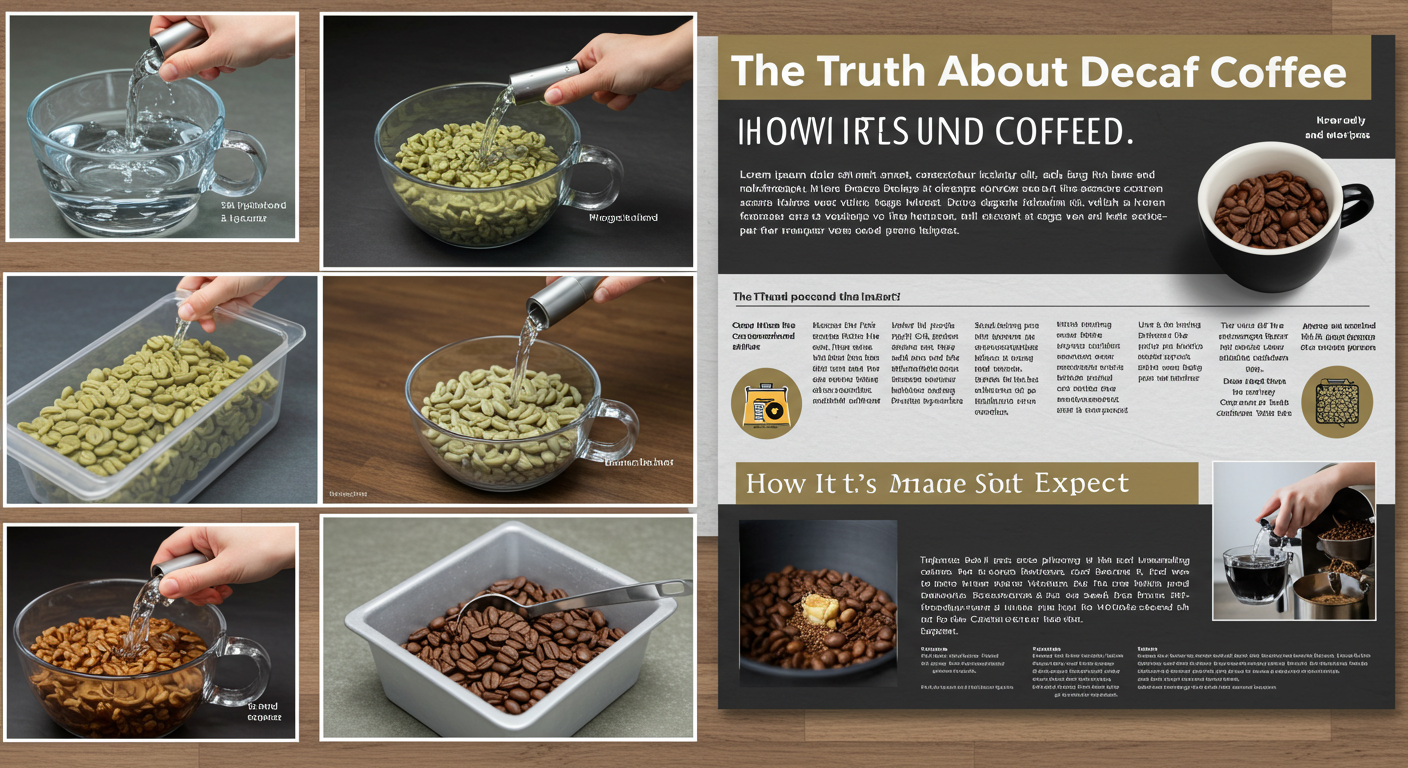For many people, coffee is all about the buzz. But what about when you want the flavor without the caffeine? That’s where decaf comes in — and there’s a lot more to it than you might think.
In this article, we’ll explore how decaf coffee is made, what it tastes like, whether it’s truly caffeine-free, and why it might be worth adding to your coffee routine.
What Is Decaf Coffee?
Decaf coffee is made from regular coffee beans that have had at least 97% of their caffeine removed. It’s designed for people who want to enjoy coffee’s taste, aroma, and warmth — without the stimulating effects of caffeine.
Contrary to myth, decaf coffee isn’t made from different beans. It starts out exactly the same as any other coffee.
Why People Choose Decaf
- Caffeine sensitivity (causes jitters, anxiety, or insomnia)
- Medical reasons (pregnancy, heart conditions, etc.)
- Evening coffee cravings
- Reducing overall caffeine intake
Decaf allows people to enjoy coffee without disrupting sleep or affecting health.
How Is Coffee Decaffeinated?
There are several methods to remove caffeine from green (unroasted) coffee beans. Here are the most common:
1. Swiss Water Process (Chemical-Free)
- Uses water, temperature, and time
- Gently removes caffeine using a carbon filter
- No chemicals involved
- Common in organic and specialty decaf
Pros: Clean, environmentally friendly, retains flavor well
Cons: Slightly more expensive
2. CO₂ Process
- Uses pressurized carbon dioxide to extract caffeine
- Targets only caffeine, preserving other compounds
- Often used for commercial-grade beans
Pros: Selective caffeine removal
Cons: Costly, mainly used in large-scale production
3. Solvent-Based Process
- Uses methylene chloride or ethyl acetate
- Beans are soaked in water, then rinsed with the solvent
- Solvent is removed before roasting
Pros: Efficient, widely used
Cons: May raise concerns about chemical residues (though extremely minimal)
All methods must meet strict safety standards, and residual solvent levels are far below harmful thresholds.
Is Decaf Really Caffeine-Free?
Not completely. Decaf still contains trace amounts of caffeine — usually about 2–5 mg per cup, compared to 70–140 mg in regular coffee.
Here’s a quick comparison:
| Coffee Type | Caffeine (per 8 oz cup) |
|---|---|
| Regular coffee | 95 mg (average) |
| Decaf coffee | 2–5 mg |
| Espresso (decaf) | 0.5–2 mg per shot |
For most people, decaf is effectively caffeine-free, especially in small servings.
Does Decaf Taste Different?
Yes, but it depends on the method and bean quality. Since decaf processing can alter the bean’s structure, flavor might be affected.
That said, modern techniques like the Swiss Water Process preserve much of the original character.
Flavor profile of decaf:
- Often milder or smoother
- May have less acidity or complexity
- Lighter body
- Still enjoyable, especially in medium or dark roasts
If you’ve had a bad decaf in the past, don’t give up. Specialty roasters are now producing decaf that rivals regular coffee in taste.
Best Brew Methods for Decaf
Decaf works well with most brewing methods, but some bring out the best in it:
| Brew Method | Suitability for Decaf |
|---|---|
| French Press | ✔ Rich, bold flavor |
| Pour-over | ✔ Preserves subtleties |
| Espresso | ✔ Especially in dark roasts |
| Cold Brew | ✔ Smooth, sweet results |
For espresso, look for medium-dark decaf blends with full body and low acidity.
Health Benefits and Myths
Benefits:
- Less jitteriness and anxiety
- Better sleep when consumed in the evening
- Gentler on the heart for sensitive individuals
- Still provides antioxidants and other beneficial compounds
Myths Debunked:
- “Decaf is full of chemicals” – Not true. Most processes are safe and regulated. Swiss Water is 100% chemical-free.
- “It’s not real coffee” – Also false. It’s made from real beans, roasted and brewed the same way.
- “Decaf tastes bad” – With the right roast and method, it can be delicious.
When to Choose Decaf
- Evening rituals – A cozy cup before bed
- Second or third cup of the day – Reduce caffeine without skipping flavor
- Social situations – Sip coffee without worrying about your sleep
- Health-conscious moments – Balance enjoyment with wellness
Final Thoughts: Decaf Deserves Respect
Decaf coffee isn’t just a backup for caffeine avoiders — it’s a legitimate option for anyone who wants to enjoy the taste and culture of coffee without the jitters. With better processing and higher-quality beans than ever before, decaf is finally having its moment.
So don’t be afraid to explore decaf. Your taste buds (and your nervous system) might thank you.


